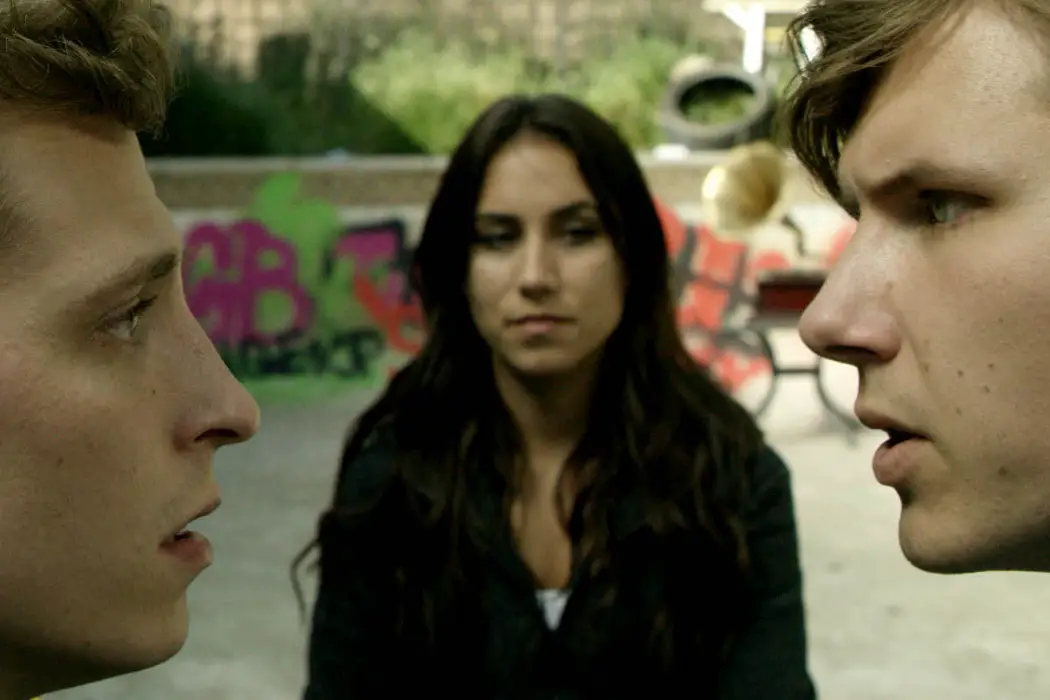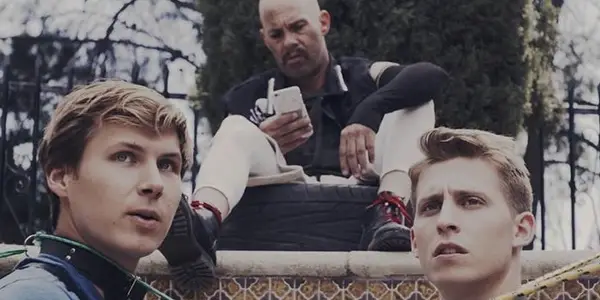GROUPERS: An Unconventional Experiment

Andrew Stover is a film critic/writer from the Chicagoland. His…
Groupers poses the question: Is homosexuality a choice? This question is introduced by Meg (Nicole Dambro of The Axiom), a ballsy and acrid grad student, trying to prove or disprove this scientific thesis. But this particular experiment she’s cooking up isn’t conventional, and in no way is it justified.
Groupers is the feature debut from writer/director Anderson Cowan (who’s originally known as the co-host of The Film Vault podcast). It’s an oddball feature debut, encountering a detour along the way, but it is a fairly memorable experiment.
The opening scene navigates the compacted and crowded interior of a soiled bar, gracefully swaying the camera around until landing on two young jocks, Brad (Peter Mayer-Klepchick of The Girl on the Train) and Dylan (Cameron Duckett of Secondborn), and an attractive young woman named Meg. She impairs them with booze and promises them a wild night, only to guide them to her white van, drug them and restrain them in an empty pool in a void neighborhood.
They’re strapped up, close enough so they’re able to stare each other in the eyes (aka the window to the soul). More explicitly, their penises are connected by a Chinese finger-cuff. When they get hard, their things will touch and ring a little bell. This is part of Meg’s experiment to answer that age-old question: Is homosexuality a choice? One little ring and this experiment concludes, and the homophobic jocks get to prove their theory they hold so dearly: homosexuality is indeed a choice. But you also soon realize Meg isn’t solely trying to complete her college thesis, she’s out for some “light” vengeance.
Meg’s ardor for the research is kindled from the abuse of her gay brother, Orin (Jesse Pudles), implemented by none other than Brad and Dylan. A myriad of tests will expose their secrets, all while the study is being live-streamed, and Orin is determined to exploit the experiment in its entirety. It all is a bit of theatrics that lies on the edge of what is feasible, much in the way of films like Hard Candy and Pecker.
It All Starts With An Offbeat Experiment…
There’s no denying that Cowan is wrestling a newfangled premise, which could very easily come off as flagrant or grotesque. The idea of a woman drugging two homophobic jocks and strapping them up, with their penises ensnared in a Chinese finger-cuff, all for some kind of vengeful experiment, is hard to swallow. It’s incredibly difficult to make this premise work without being foolishly offensive. Unlike in any other experiment, where one tiny hiccup can blemish the results, Groupers is one big and messy experiment that pays off in adequate portions.
Despite what the concept suggests, it’s not torture porn; it leans more toward black comedy, with social subtexts about the causes of homophobia and the corollaries of bullying. For all of its depravity, Meg does pull off the start of the experiment quite immaculately. Long before we know how far their homophobic bullying went, the jocks are sketched as plaguy and self-absorbed — but in no way is their kidnapping warranted. Brad and Dylan are in a sticky situation, tied up in an empty swimming pool, confronted by Meg, and they’re forced to play Meg’s game and reflect on the abuse they inflicted on Orin. The majority of the first half highlights the acting chops of Mayer-Klepchick, Duckett and Dambro, who deftly bounce quips off one another. The small cast embraces their own distinct personalities, to the point that their interactions are natural.
Peter Mayer-Klepchick portrays Brad, the levelheaded and quick thinking jock, who tries to undermine Orin’s abuse (“Normal high school stuff. It happens every day.”). Whether it be direct or indirect, people are bullied every day. LGBT people are more susceptible to bullying because of ingrained beliefs and heartless opinions. The ramifications of such maltreatment can be baleful and life-threatening. Brad, being this brawny jock in denial, dares to trivialize the consequences of his actions. As for Dylan, he has no common sense, and he also has a damaging secret. Cameron Duckett plays Dylan with conscious dullness, uttering swift, lowbrow humor, which coexists well with Brad’s composure and low tolerance of stupidity. The two jocks interact in playful persiflage, which is rollicking enough to keep audiences invested.

Radiating dodgy confidence and fiery anger, Meg is dedicated to proving or disproving that homosexuality is a lifestyle choice — a theory in which Brad and Dylan convince themselves is true. Nicole Dambro is a fierce, implacable and arresting presence, allowing Meg to roam in sordid territory while still being slightly likable. There’s something about Meg’s self-assurance that wins you over, to an extent. The first half utilizes its tiny cast, fitting subject matter and the bonkers concept to arrive at a clear-cut destination — a destination that’s potentially more serious than what the vulgar banter and tasteless scenario indicates.
The film perpetually changes perspectives. The start of the movie showcases Meg’s perspective, and how she dupes the two jocks. Eventually, we do go back to Brad and Dylan’s viewpoint, before stumbling to the bar and getting shitfaced. When the second half comes along, the cast doubles in size and the film’s structure goes non-linear in a Tarantino-esque manner. The stellar performances from Mayer-Klepchick, Duckett and Dambro are interrupted by gang members and a vindictive Orin (who’s racked up with drugs). From there, the fun is muddled by more inflated characters, who are more irksome than amusing. The destination takes a turn when new characters surface, and fruitless dialogue saturates the screen (but without the Tarantino spark, and without prompting any genuine laughs or insights).
“It’s Not Nearly As Fun As I Thought It Would Be.”
There comes a point when Meg blurts out how less fun this whole scientific gambit turns out to be, and I can’t help but agree — then again, I would never do this. When Meg’s not upholding a facade, and eagerly declaring the rules of the experiment and what the jocks have to do to end the trial, behind-the-scenes, Meg is struggling to go through with it. Of course, it’s not at all fun kidnapping somebody and using them as guinea pigs. No matter how much Orin suffered from the ruthless hands of Brad and Dylan, fighting violence with violence, or becoming the bully, isn’t a virtuous reaction. It just so happens that Meg is taking vengeance a step further, as is Cowan, brazenly so. As well-aware viewers, we know Meg’s actions aren’t vindicated, and the experiment is meant to be wantonly kooky and juvenile. But what happens when splashes of severity are incorporated somewhere between the freakish antics?
Cowan’s picture is a novel if largely chaotic spin on the causes and effects of bullying, and how we willfully become the bully. These topics have been explored before, more effectively for that matter (from the blood-soaked tale of Carrie to the mordacious style of Heathers), but what keeps Cowan’s feature from collapsing during its bloated middle portion is a tempting self-awareness. Not only is the cast aware of their characters’ amplified traits, but Milan Janicin‘s cinematography wonderfully compiles close-up shots that are as judgmental as they are fluid. When the camera gets extremely intimate with Brad and Dylan, you can’t help but judge their cowardliness and insecurity. When the camera captures Meg alone, and from a distance, she’s not as formidable. The shot composition does kind of spell out their motivations. For instance, one shot involves Meg explaining the rules to Brad and Dylan, and behind Meg, is graffiti that spells out “revenge”. Funnily enough, Meg is moderately driven by revenge.

In many cases, homophobic bullying may be steered by a crippled self-image, and the bully may be trying to repress their own homosexual feelings because they think being gay is “unmanly” or a disgraceful defect — even more so when the bully in question is a popular jock. LGBT people, in particular, being treated unfairly by peers is woefully common. For a bully to devalue his/her own actions, is also awfully wonted. No new topics are scrutinized, but Cowan’s approach to said subjects benefits from its snippet of farcicality.
As for Orin — the bullied gay character who endured Brad and Dylan’s abuse and ridicule — he’s handled crudely. Substituting drugs in the place of trauma is devastatingly real, and Orin’s fast-talking, rampageous essence overwhelms the more poignant beats. As gang members infiltrate the scene, Meg is forced off-screen, which also means the one character who kept everything together, is now gone for the bulk of the second half. Hank (Travis Stanberry) and Frank (Max Reed III) enter as halfwitted gangsters, and their long-winded conversations lead nowhere (tonally and literally). Thankfully, Meg eventually returns more dominant than ever, and that’s where Cowan gets back on track. Groupers begins and ends strong, whereas the middle is essentially a series of conversations and dick jokes that wear thin.
Groupers Is Grouped Together By Forceful Performances
“It’s like when the victim becomes the bully, and then they relish in it way too much…” Cowan’s execution isn’t subtle, nor is it always neat or vital, but it’s strangely engrossing. Like a stagey skit, it starts fairly simple and exaggerates characters and situations knowingly, while still faintly staying in the realm of reality.
At first, Groupers seems to be going somewhere, and the three leads keep up with the sinful silliness of it all. The middle section is a critical miscalculation (with too many characters, humdrum exchanges and tonal shifts), but it wins back the viewer’s interest at the end. Anderson Cowan’s directorial debut isn’t perfect, and it certainly isn’t a mainstream product for the masses, but it has its merits. When this zany cinematic experiment is at its best, it churns out successful results about bullying and homophobia.
What is your favorite boundary-pushing comedy or thriller? Let us know in the comments!
Groupers made its premiere at the Cinequest Film Festival on March 9, 2019. It’s getting a theatrical release in L.A. & N.Y. on September 27, 2019, until expanding to more cities October 1, 2019.
Does content like this matter to you?
Become a Member and support film journalism. Unlock access to all of Film Inquiry`s great articles. Join a community of like-minded readers who are passionate about cinema - get access to our private members Network, give back to independent filmmakers, and more.
Andrew Stover is a film critic/writer from the Chicagoland. His film & TV reviews can be found on Film Inquiry & Film Threat.












